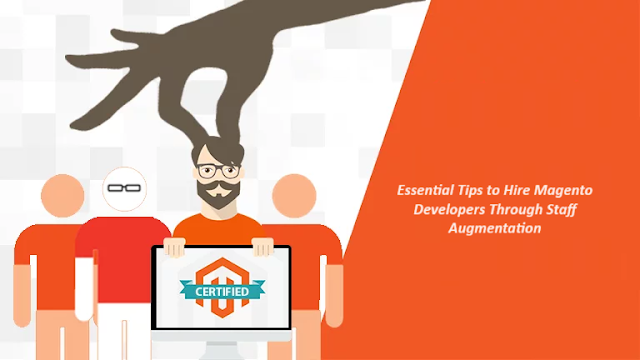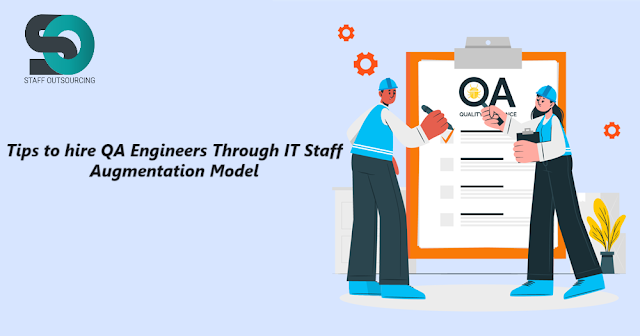Essential Tips to Hire Magento Developers Through Staff Augmentation
In today's competitive e-commerce landscape, having a robust and feature-rich online store is no longer optional. Magento, a leading open-source e-commerce platform, empowers businesses to create powerful and scalable online stores. However, building and maintaining a Magento store necessitates the expertise of skilled developers.
This is where staff augmentation comes in. Staff augmentation allows you to seamlessly integrate skilled Magento developers into your existing team for a defined period. It's a cost-effective and flexible solution to address specific project needs or ongoing maintenance tasks.
But how do you ensure you to hire Magento developers through staff augmentation? Here are some essential tips to guide you through the process:
1. Define Your Project Requirements Clearly
Before embarking on your hiring journey, clearly define your project goals and requirements. Here are some key questions to consider:
What functionalities are you looking to add to your Magento store? (e.g., custom product pages, payment gateways, advanced search filters)
Do you need ongoing maintenance and support for your existing store?
What is the project timeline and budget?
What level of Magento expertise is required for the project? (e.g., basic understanding, proficiency in specific modules)
2. Partner with a Reputable Staff Augmentation Agency
Choosing the right agency is crucial. Partner with a company that has a proven track record of placing qualified Magento developers. Look for an agency with the following characteristics:
Experience in e-commerce development: The agency should have a deep understanding of the e-commerce landscape and specific expertise in Magento development.
Strong network of developers: They should have a large pool of vetted Magento developers with varying skillsets to match your specific project needs.
Effective communication: Clear and consistent communication is essential. The agency should be able to understand your requirements and translate them into actionable profiles for developers.
Transparent pricing: Understand the agency's fee structure and ensure it aligns with your budget.
3. Refine Your Candidate Search
Once you've partnered with an agency, collaborate on refining your candidate search. Here's how:
Technical skills: Identify the specific Magento skills required for your project. This might include experience with Magento versions, proficiency in front-end and back-end development, knowledge of specific Magento extensions, and familiarity with best practices.
Soft skills: While technical expertise is crucial, don't overlook soft skills. Look for developers with excellent communication, problem-solving abilities, a collaborative nature, and a strong work ethic.
Cultural fit: Assess how well the developer would integrate with your existing team. Consider factors like communication style, time zone compatibility, and overall work culture.
4. Conduct Rigorous Interviews
The interview stage is where you can assess a candidate's technical skills, cultural fit, and communication style. Here are some interview tips:
Technical interview: Prepare a series of questions that delve into the developer's Magento knowledge. You could ask about their experience with specific modules, debugging techniques, and best practices for Magento development. Consider providing a coding challenge relevant to your project.
Cultural fit interview: Ask questions to understand the candidate's work style, communication preferences, and ability to collaborate effectively. Present a scenario relevant to your project and see how they approach problem-solving within a team setting.
Reference checks: Contact past employers or colleagues of the candidate to get a well-rounded perspective on their work ethic, skills, and overall fit.
5. Onboarding and Integration
Once you've selected the right developer, a smooth onboarding process is crucial. Here are some essential steps:
Clearly define project goals and expectations: Provide the developer with detailed project documentation, including timelines, milestones, and deliverables.
Introduce the developer to your team: Facilitate introductions with your team members, ensuring clear lines of communication and collaboration.
Set up development environment: Provide the developer with access to the necessary tools, resources, and development environment they require to be productive.
Regular communication: Maintain regular communication with both the agency and the developer to ensure smooth project progress and address any concerns.
6. Effective Project Management
Successful staff augmentation requires effective project management. Here are some key aspects to consider:
Clear communication: Maintain open communication channels between yourself, the agency, and the developer. Regular progress reports and status updates are essential.
Project management tools: Leverage project management tools like Asana or Trello to track tasks, deadlines, and resource allocation.
Performance reviews: Conduct regular performance reviews with the developer to provide feedback and ensure alignment with project goals.
7. Benefits and Considerations
Staff augmentation offers several advantages:
Cost-effectiveness: You only pay for the developer's time needed for the project, reducing overhead costs compared to full-time hiring.
Scalability: Easily adjust the number of developers based on your project's evolving needs.
Access to a wider talent pool: Staff augmentation agencies have access to a vast network of skilled developers, increasing your chances of finding the right fit.
Reduced workload & expertise: The agency handles the recruitment process, freeing you to focus on your core business.
However, there are also some considerations:
Management overhead: Managing an additional team member requires investment in onboarding, communication, and potentially additional project management tools.
Integration challenges: New developers need time to integrate with your team's workflow and project structure.
Less control: You might have less direct control over the developer's day-to-day tasks compared to a full-time employee.
8. Alternatives to Staff Augmentation
While staff augmentation is a great option, consider these alternatives:
Freelance developers: Freelance platforms offer access to a large pool of Magento developers, but vetting skills and ensuring project completion can be challenging.
Full-time hiring: Hiring a full-time Magento developer offers greater control and potentially deeper integration with your team. However, recruitment can be time-consuming and may not be necessary for short-term projects.
Conclusion
Staff augmentation can be a powerful tool for businesses seeking to leverage Magento development expertise for specific projects or ongoing maintenance. By following these essential tips, you can increase your chances of finding the right developers, ensuring a smooth onboarding process, and achieving successful project outcomes.
Here are some additional points to consider:
Stay updated on Magento trends: The Magento landscape is constantly evolving. Keep yourself updated on the latest versions, modules, and security best practices.
Invest in developer training: Consider providing ongoing training opportunities for your staff augmentation developers to stay ahead of the curve.
Develop a strong working relationship: Building a positive working relationship with the agency and the developer fosters trust and collaboration, leading to a more successful engagement.
By following these comprehensive strategies, you can leverage staff augmentation to empower your Magento development team and achieve your e-commerce goals.



Comments
Post a Comment